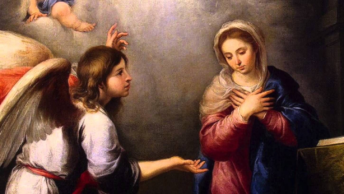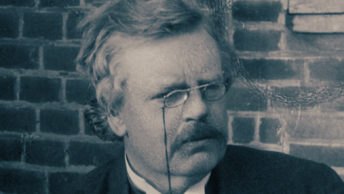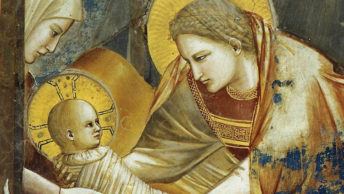I know a man named Ralph, (not his real name). As a young man, Ralph met a beautiful woman who he fell deeply in love with. They were married and lived a life together filled with joy and happiness. But, sadly, their blissful existence ended tragically one day when the car that his young wife was driving was struck broadside by a drunk driver who ran a red light, killing her instantly.
Ralph endured the agony of her funeral. And afterwards, life for him was empty and he was left feeling lonely and confused.
After many years of loneliness and grief, Ralph met a woman who filled the emptiness in his heart. They were married and again Ralph experienced that happiness and joy that he so deeply missed. One day, just before Christmas, Ralph’s wife developed a bruise on her leg. It felt hard, and thinking that it might be a blood clot, they went to see the doctor. It was then that they discovered that she was suffering from a rare blood disease. She was immediately hospitalized for treatment. But sadly she lost her life just a few short weeks later, dying right after the New Year’s holiday.
Ralph was a young man, in his early thirties, and already he had experienced the heartbreak of being a widower twice. Ralph is profoundly aware of the brevity of our earthly existence and the fragility of our mortal bodies.
Ralph now spends as much time as he can traveling, finding happiness in enjoying the many natural beauties that this earth has to offer. And he finds joy and fulfillment in caring for his aging and infirmed father. Obviously Ralph has to earn a living, but Ralph knows what is truly important in life, so he is oblivious to the pressures that business and industrial schedules frequently present.
This weekend the Church celebrates the second Sunday of Advent. We are fast approaching the season of Christmas, my favorite time of the year. It is my favorite time of the year because of the happiness that it brings. Most people are thinking about what they can buy, what they can make, or what they can do for someone else. But knowing Ralph has taught me that, in celebrating the Christmas season, we must not lose sight of what is truly important in life.
The first reading (Isaiah 11:1-10), for example, speaks about the ideal King that will sprout from the family tree of David. The rulers of this world have always relied upon the resources of the world for their power. In contrast, this ideal King will rely solely upon God. In fact, the very soul of this ideal King will radiate the Spirit of God.
In our second reading, St. Paul (Romans 15:4-9) reminds his readers that the Spirit of God, that lives within and guides the Christian community, will lead all souls to live in harmony with one another.
And in our Gospel reading (Matthew 3:1-12), John the Baptist calls those who came out to see and hear him to cleanse their souls through repentance.
In our culture, an awful lot of attention is paid to the body. Very little attention is given to the soul. I thought about that in light of our preparations for the season of Christmas, and our desire to bring happiness and joy to others. However, we, in our culture, have confused the two terms happiness and joy. Happiness is pleasure, self-gratification, whatever feels good. On the other hand, the true Biblical concept of joy has little to do with pleasure and self-gratification. “Joy and happiness are wonderful feelings to experience, but are very different. Joy is more consistent and is cultivated internally. It comes when you make peace with who you are, why you are and how you are, whereas happiness tends to be externally triggered and is based on other people, things, places, thoughts and events.” (Psychologies September 2015)
How do you define joy? Jesus said, “I have told you this so that my joy may be in you and that your joy may be complete.” (John 15:11)
Joy is a God given reality and is an integral part of the promises fulfilled by Christ’s coming. The Catholic encyclopedia says that, “Joy is the feeling of delight and satisfaction that is singularly related to the Christian virtue of charity. It is the intersection and interaction of the senses and the soul of the human person”
Joy, therefore, is a gift. Everyone can find happiness through pleasure, if that is their goal. Joy, on the other hand, does not come to those who make it their goal. Joy comes to us, as an unexpected gift, after we have gone after something else. Happiness is to the body what joy is to the soul.
Think of it this way. What happens in the relationship between two people if one of the parties makes their own happiness their primary goal? That relationship would obviously be doomed to failure. In contrast, what happens in the relationship between two people if one of the parties makes the other person’s happiness their primary goal? Now what happens if both parties make the other person’s happiness their primary goal? The result can only be defined as joy. A state of being that can not be described or understood in physical terms, but a state of being that glows in the heart and can only be understood in terms of the soul.
With that thought and understanding in mind, look again at this weekend’s Gospel.
John the Baptist cries out, “You brood of vipers! Give some evidence that you mean to reform.” (Matthew 3:7-8) Repentance for John meant totally reorienting one’s life toward a greater good. He was particularly harsh on the Pharisees and the Sadducees who presumed that being a descendant of Abraham was enough. And because of this presumption, they shunned their many social responsibilities, especially in relation to the poor and the needy.
In other words, John is saying, “Quit thinking only of your own well-being, and live productive lives for God.” Later on, Jesus would say, “Seek first the Kingdom of God and His righteousness, and all these things will be given to you as well.” (Matthew 6:33)
This may appear to be bad news to some, but it is only when we forget about our preoccupation with the pursuit of our own pleasures, that we become candidates for true joy. Or to restate that same thought differently, in order for joy to become a gift, it is necessary that it ceases being your goal. It comes to you as a surprise when you are focused on something else.
What is true in so many areas of our life is supremely true in the Christian life. Joy is not the goal. Joy is the gift.
Those who seek joy first will likely never find it. Those who seek to serve God, the neighbor, and the common good, will know surprising moments of unspeakable joy. To ever find joy, you must give it up as your greatest desire.
True, there are countless pleasures that we can pursue directly. There are many forms of happiness that we can experience and enjoy. But the deep joy that glows in your heart and soul, the joy that echoes in the song of the angels, the kind of joy that has touched you so deeply and so profoundly at different moments in your life, that joy is the by-product of discipleship. That joy is only discovered when one becomes so absorbed in seeking and serving the Kingdom of God and others that the search for joy is forgotten.
Everyone wants to experience the gift of Christmas joy. But as long as you seek it directly, it will elude you forever. But when you are washing the world’s feet, when you keep your eyes focused on the needs of others, when you make your life an offering to others and to God, then that mysterious joy will slip in unnoticed and catch you by surprise.
I pray that everyone reading this may truly experience the joys of Christmas as we prepare for this holiday season.








